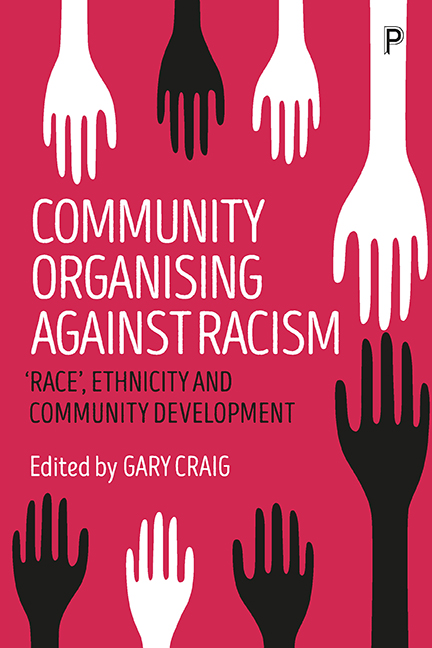Book contents
- Frontmatter
- Dedication
- Contents
- List of figures
- Author biographies
- List of abbreviations
- Introduction
- Section One Community development with ethnic minorities: history, theory, policy
- Section Two Building capacity with BME groups
- Section Three Working with Roma communities
- Section Four Global experience
- Section Five Working across cultural boundaries: ideological and personal reflections
- Afterword: Messages for community development in working with minority groups
- Index
Section Two - Building capacity with BME groups
Published online by Cambridge University Press: 12 April 2022
- Frontmatter
- Dedication
- Contents
- List of figures
- Author biographies
- List of abbreviations
- Introduction
- Section One Community development with ethnic minorities: history, theory, policy
- Section Two Building capacity with BME groups
- Section Three Working with Roma communities
- Section Four Global experience
- Section Five Working across cultural boundaries: ideological and personal reflections
- Afterword: Messages for community development in working with minority groups
- Index
Summary
This section describes a range of projects and programmes that aim to ‘build capacity’ with BME groups of different kinds, including longsettled minority populations, migrant workers and asylum seekers. Although I (and others) have been critical of the term ‘capacity building’ elsewhere as simply ‘an old wine in a new bottle’, its use seems appropriate here since all of the contributions, in differing ways, describe work to help build varying dimensions of capacity among the groups that community workers are helping to organise and support, whether knowledge, understanding, skills, organisational frameworks or abilities – for example, to access services or make them more culturally appropriate to the needs of minority users and, critically, do so in a ‘bottom-up’ manner. The contexts include work around health, mental health, arts and culture, the labour market and other forms of service provision.
Ware's Chapter Three (which also helpfully reviews some of the key literature around the concept of capacity building) describes a continuing struggle among BME VCS groups to obtain secure funding for a range of work where, on the one hand, those groups were viewed by major funders as being weakly organised, yet, at the same time, were allegedly the targets of funding streams that were unequally distributed, to their disadvantage. Without secure and autonomous organisations, the voice of BME groups remained largely silent or, at best, mediated through the advocacy of ‘mainstream’, that is white, organisations who were more concerned with their own survival.
In Chapter Four Smith and Moreno-Leguizamon focus on a particular organisational approach, Learning Alliance partnerships, as a way to help BME groups access health services provision in a most sensitive area, that of palliative care and end-of-life support. Critically, despite the fact that small BME groups with little experience of engagement in this work might well be overwhelmed by the institutional inertia and lack of sensitivity of professional statutory health organisations, the account demonstrates how it is possible for BME groups to insert their own needs and knowledge effectively, and to begin to exert some control over the development of culturally appropriate policy and practice.
- Type
- Chapter
- Information
- Community Organising against Racism'Race', Ethnicity and Community Development, pp. 65 - 80Publisher: Bristol University PressPrint publication year: 2017



